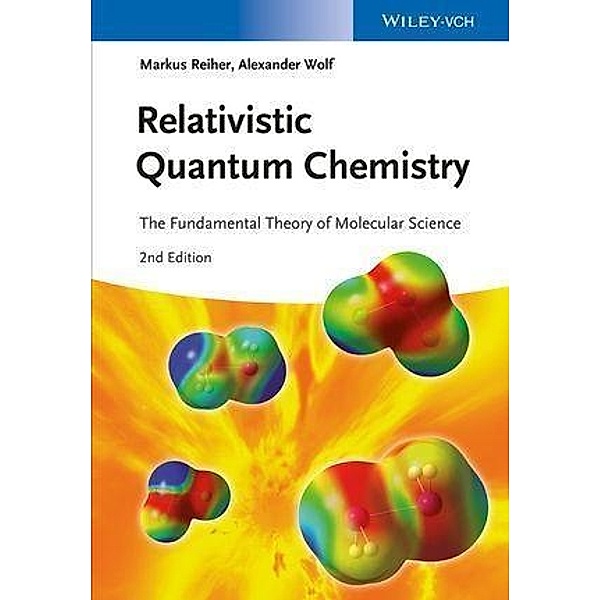Relativistic Quantum Chemistry (ePub)
The Fundamental Theory of Molecular Science
(Sprache: Englisch)
Einstein proposed his theory of special relativity in 1905. For a long time it was believed that this theory has no significant impact on chemistry. This view changed in the 1970s when it was realized that (nonrelativistic) Schrödinger quantum mechanics...
sofort als Download lieferbar
eBook (ePub)
178.99 €
- Lastschrift, Kreditkarte, Paypal, Rechnung
- Kostenloser tolino webreader
Produktdetails
Produktinformationen zu „Relativistic Quantum Chemistry (ePub)“
Einstein proposed his theory of special relativity in 1905. For a long time it was believed that this theory has no significant impact on chemistry. This view changed in the 1970s when it was realized that (nonrelativistic) Schrödinger quantum mechanics yields results on molecular properties that depart significantly from experimental results. Especially when heavy elements are involved, these quantitative deviations can be so large that qualitative chemical reasoning and understanding is affected. For this to grasp the appropriate many-electron theory has rapidly evolved. Nowadays relativistic approaches are routinely implemented and applied in standard quantum chemical software packages. As it is essential for chemists and physicists to understand relativistic effects in molecules, the first edition of "Relativistic Quantum Chemistry - The fundamental Theory of Molecular Science" had set out to provide a concise, comprehensive, and complete presentation of this theory.
This second edition expands on some of the latest developments in this fascinating field. The text retains its clear and consistent style, allowing for a readily accessible overview of the complex topic. It is also self-contained, building on the fundamental equations and providing the mathematical background necessary. While some parts of the text have been restructured for the sake of clarity a significant amount of new content has also been added. This includes, for example, an in-depth discussion of the Brown-Ravenhall disease, of spin in current-density functional theory, and of exact two-component methods and its local variants.
A strength of the first edition of this textbook was its list of almost 1000 references to the original research literature, which has made it a valuable reference also for experts in the field. In the second edition, more than 100 additional key references have been added - most of them considering the recent developments in the field.
Thus, the book is a must-have for everyone entering the field, as well as for experienced researchers searching for a consistent review.
This second edition expands on some of the latest developments in this fascinating field. The text retains its clear and consistent style, allowing for a readily accessible overview of the complex topic. It is also self-contained, building on the fundamental equations and providing the mathematical background necessary. While some parts of the text have been restructured for the sake of clarity a significant amount of new content has also been added. This includes, for example, an in-depth discussion of the Brown-Ravenhall disease, of spin in current-density functional theory, and of exact two-component methods and its local variants.
A strength of the first edition of this textbook was its list of almost 1000 references to the original research literature, which has made it a valuable reference also for experts in the field. In the second edition, more than 100 additional key references have been added - most of them considering the recent developments in the field.
Thus, the book is a must-have for everyone entering the field, as well as for experienced researchers searching for a consistent review.
Autoren-Porträt von Markus Reiher, Alexander Wolf
Markus Reiher obtained his PhD in Theoretical Chemistry in 1998, working in the group of Juergen Hinze at the University of Bielefeld on relativistic atomic structure theory. He completed his habilitation on transition-metal catalysis and vibrational spectroscopy at the University of Erlangen in the group of Bernd Artur Hess in 2002. During that time he had the opportunity to return to relativistic theories when working with Bernd Hess and Alex Wolf. From 2003 to 2005, Markus Reiher was Privatdozent at the University of Bonn and then moved to the University of Jena as Professor for Physical Chemistry in 2005. Since the beginning of 2006 he has been Professor for Theoretical Chemistry at ETH Zurich. Markus Reiher's research interests in molecular physics and chemistry are broad and diverse.Alexander Wolf studied physics at the University of Erlangen and at Imperial College, London. In 2004, he completed his PhD in Theoretical Chemistry in the group of Bernd Artur Hess in Erlangen. His thesis elaborated on the generalized Douglas-Kroll-Hess transformation and efficient decoupling schemes for the Dirac Hamiltonian. As a postdoc he continued to work on these topics in the group of Markus Reiher at the universities of Bonn (2004) and Jena (2005). Since 2006 he has been engaged in financial risk management for various consultancies and is currently working in the area of structuring and modeling of life insurance products. On a regular basis he has been using his spare time to delve into his old passion, relativistic quantum mechanics and quantum chemistry.
Bibliographische Angaben
- Autoren: Markus Reiher , Alexander Wolf
- 2014, 2. Auflage, 750 Seiten, Englisch
- Verlag: Wiley-VCH
- ISBN-10: 352766758X
- ISBN-13: 9783527667581
- Erscheinungsdatum: 23.09.2014
Abhängig von Bildschirmgröße und eingestellter Schriftgröße kann die Seitenzahl auf Ihrem Lesegerät variieren.
eBook Informationen
- Dateiformat: ePub
- Größe: 20 MB
- Mit Kopierschutz
Sprache:
Englisch
Kopierschutz
Dieses eBook können Sie uneingeschränkt auf allen Geräten der tolino Familie lesen. Zum Lesen auf sonstigen eReadern und am PC benötigen Sie eine Adobe ID.
Kommentar zu "Relativistic Quantum Chemistry"
0 Gebrauchte Artikel zu „Relativistic Quantum Chemistry“
| Zustand | Preis | Porto | Zahlung | Verkäufer | Rating |
|---|





Schreiben Sie einen Kommentar zu "Relativistic Quantum Chemistry".
Kommentar verfassen